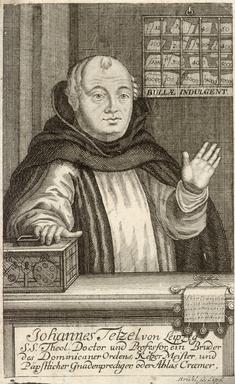A Dominican prior and inquisitor, Johannes Tetzel became notable at the outset of the Reformation as the preacher of indulgences who instigated Luther’s 95 Theses. Born 1465 in Pirna near Meissen, he would receive education in Leipzig from 1482 to 1487, earning the bachelor of arts, before joining the Dominican order in 1489. He ascended to the rank of prior in Poland in 1497. The superior general of the Dominicans, Cardinal (Tomasso de Vio Gaetani) Cajetan, eventually named him inquisitor in Poland, where he sought to enforce church doctrine in his order. He would later receive his licentiate in 1509 and his doctorate in 1518, both from the University of Frankfurt-on-Oder. Tetzel’s role in the preaching of indulgences, however, brought him into conflict with Luther.
Indulgences had arisen in the Middle Ages as a means to earn remission for sins, first preached by Pope Urban II in 1095 to those who would participate in a crusade. Indulgences were subsequently granted for such acts as pilgrimages, could be conferred on the dead in purgatory, and eventually became sold from the so-called Treasury of Merits, a cache of remission accrued through the deaths of Christ and the martyrs. The theology supporting indulgences trailed behind their preaching and sale. Rome only authorized the sale of specific indulgences to purchase in 1476, while the doctrine of purgatory itself was not affirmed until 1439. Consequently, the practice was open to scholarly debate at the time of the Reformation.
Tetzel had a long history as an indulgence preacher prior to the controversy with Luther. Between 1503 and 1510, he would preach indulgences in ten different German cities. He was first commissioned to preach jubilee indulgences for three years under the auspices of the Teutonic Knights of Livonia, who had obtained the right to sell indulgences in Magdeburg, Bremen, and Riga from Pope Alexander VI. Alexander’s successor, Julius II, extended his commission another three years in 1506, this time to Cologne, Mainz, and Trier. In 1509, Tetzel would preach indulgences in Strasburg, and in 1510 he would do the same in Nuremburg, Würzburg, and Bamberg.
The occasion for his preaching of indulgences near Wittenberg was Pope Leo X’s commissioning of their sale for Albrecht of Mainz. Albrecht was already bishop of the diocese of Magdeburg, but sought a second see in Mainz. In order to pay the fines levied for his pluralism (occupation of a second bishopric), Albrecht obtained a sizeable loan from the Fugger bankers in Augsburg. Leo X authorized the sale of indulgences to repay the loan to the Fuggers and help subsidize the rebuilding of St. Peter’s basilica in Rome. The pope published a 1515 bull commissioning the sale and Tetzel—prior in Leipzig since 1509—was conscripted to preach it.
Appointed subcommissioner of indulgences at Meissen in 1516, Tetzel would proceed to Albrecht’s territories of Magdeburg and Halberstadt that year. The commissioning prohibited him from preaching indulgences in Saxony, which belonged to Albrecht’s rival and Luther’s benefactor, Frederick the Wise. The closest Tetzel would come was St. Peter’s in Jüterbog, where many traveled from Wittenberg to purchase them. They also brought back tales of Tetzel and his famous rhyme: “When the coin in the coffer rings/the soul from purgatory springs.”
Luther wrote his October 1517 95 Theses in an attempt to debate the unclear theology behind indulgences, not necessarily to criticize Tetzel. Nonetheless, there were basic points in the theses directed at the Dominican preacher from Leipzig. Generally speaking, Luther took issue with Tetzel’s opinion—drawn from a rather small minority of late medieval theologians—that contrition was not necessary to obtain remission of sins when purchasing of an indulgence. This position was condemned in 1519 by none other than Cajetan himself. Luther also targeted an alleged view of Tetzel that such onerous sins as violating the Virgin Mary could be absolved by an indulgence, though this was unsubstantiated.
Tetzel entered the fray repeatedly over the next year. First, he presented a series of 106 theses against Luther’s views at a January 1518 disputation at Frankfurt. The theses were composed by Konrad Koch, a professor at Frankfurt better known as Wimpina. When the Frankfurt theses arrived at Wittenberg in March 1518 and were read eagerly by the laity, Luther wrote a German sermon (A Sermon on Indulgence and Grace) intended to make the 95 Theses more understandable to the them. In April 1518, Tetzel penned a German treatise, Vorlegung, which attempted to refute Luther’s sermon. By May 1518, Tetzel published his Subscriptas positionas, fifty theses originally used in defense of his doctorate at Leipzig. Each of these works focused chiefly upon the authority of the papacy to issue indulgences, not the theology behind the indulgences that concerned Luther at the outset of the controversy.
By the time Luther’s focus had shifted to questions of church authority at the 1519 debate with Johann Eck in Leipzig, Tetzel had taken ill and was on his deathbed. Luther wrote a letter of consolation to his former adversary that the debate over indulgences was never directed at him personally. Tetzel died of the plague 11 August 1519 and was buried under the high altar at the Dominican church in Leipzig. His role in the controversy over indulgences would characterize him in the years after his death, leading the papal ambassador, Karl von Miltitz, to blame Tetzel for the entire dispute and to make allegations of Tetzel’s personal immorality, again not entirely substantiated.
